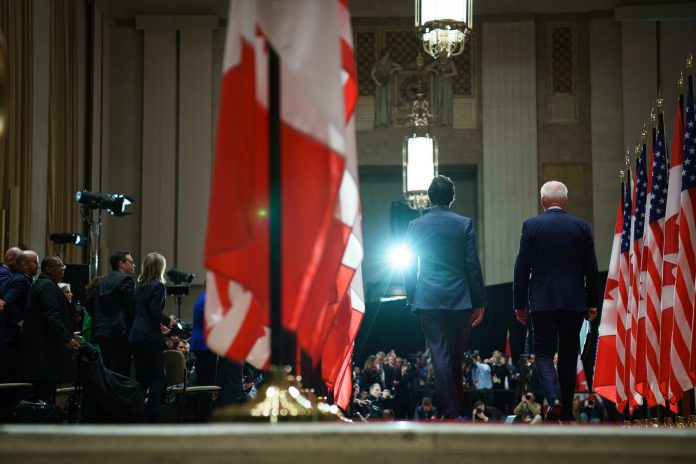Canada and the United States will work together to develop critical mineral supply chains, coordinate efforts on net-zero grid development and electric vehicle charging networks, advance long-duration energy storage, measure and monitor methane and carbon dioxide emissions from fossil fuels, and promote trade in products like green steel and aluminium in the wake of U.S. President Joe Biden’s visit to Ottawa March 23-24.
Biden and Prime Minister Justin Trudeau agreed to form a one-year energy transformation task force to “accelerate cooperation on critical clean energy opportunities and supply chains,” including renewable energy and EVs, critical minerals and rare earths, power grid integration and resilience, and nuclear energy development, the two leaders said in a joint statement.
Canada also announced plans to embrace the goals of the U.S Department of Energy’s Long Duration Storage Shot (LDSS), which aims to reduce the cost of grid-scale energy storage by 90% for systems that deliver 10+ hours of duration within the decade. Canada’s efforts will focus on energy storage technologies for remote and off-grid applications.
On EVs, both countries pledged to harmonize charging standards and develop cross-border alternative fuel corridors, drawing on US$7.5 billion already allocated in the U.S. Bipartisan Infrastructure Law and C$1.2 billion in Canadian funding to build a network of electric vehicle fast chargers and community charging options on both sides of the border.
In addition to Canada’s decision to join the Biden administration’s Foundational Infrastructure for Responsible Use of Small Modular Reactor Technology (FIRST) program, the countries will coordinate efforts on North American nuclear fuel supply chains and will build broader partnerships with “longstanding allies and partners” for uranium supplies.
The quest to build a resilient and North America-based supply chain for the clean economy figured prominently in the dollar commitments from the two leaders. After Biden announced US$250 million last year under the Defense Production Act (DPA) to help finance critical mineral mining and processing for EVs and stationary storage , Trudeau promised C$1.5 billion from the Canadian Critical Minerals Infrastructure Fund for clean energy and transportation infrastructure, and another $1.5 billion through the Strategic Innovation Fund for advanced manufacturing, processing, and recycling.
The two countries also pledged to work together to identify training and work opportunities in clean energy and skilled trades, bringing together key players from multinational companies, unions, state and provincial governments, and educational and training institutions to develop the pool of talent needed for critical supply chains.
Trudeau and Biden also vowed to deepen their cooperation “on driving improvements to the cybersecurity and resiliency of our critical infrastructure,” specifically power grids and pipelines. “In each of our countries,” they declared, “should an adversary choose to target critical infrastructure systems, we will both respond.”










